MercoPress. South Atlantic News Agency
Tag: Illegal, Unregulated and Unreported (IUU)
-
Saturday, October 31st 2015 - 06:08 UTC
Frustration with CCAMLR meeting: no advance on conservation proposals

The 34th meeting of the Commission for the Conservation of Marine Living Resources closed Friday in Hobart, Tasmania with the unexpected emergence of China as a supporter for a revised Ross Sea MPA. The Antarctic and Southern Ocean Coalition (ASOC) described the Commission’s slow progress to live up to its conservation responsibilities as “challenging”.
-
Saturday, August 8th 2015 - 09:44 UTC
FAO pressing countries to ratify agreement on illegal, unreported, unregulated fishing
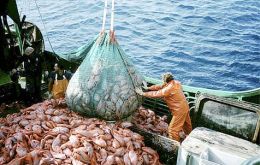
A growing number of countries are ratifying an international agreement to combat illegal fishing, fueling interest in how best to implement the instrument. Illegal, unreported and unregulated (IUU) fishing is estimated to strip between $10 billion and $23 billion from the global economy, and their impacts undermine the way fish stocks are managed to make it a double concern around the world.
-
Saturday, August 1st 2015 - 12:57 UTC
UN agreement to combat illegal fishing (IUU) close to ratification

Thirteen additional countries need to ratify an agreement brokered by the United Nations Food and Agriculture Organization (FAO) to combat illegal fishing by blocking ports to ships known or believed to be carrying illicit catches that account for more than 15% of global output, the agency said today.
-
Monday, June 22nd 2015 - 05:17 UTC
IUU fishing: Spain announces €11 million penalties against Galicia syndicate
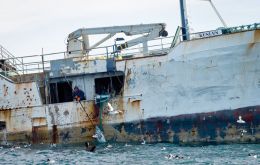
Spanish government last Friday announced penalties that could reach more than €11 million against Spanish nationals, including companies involved in illegal, unreported and unregulated (IUU) fishing. An EU coalition of three international NGOs, including Environmental Justice Foundation, Oceana and WWF described the fines as a historic moment in the battle against IUU fishing and are calling on other EU member states to follow suit with their own nationals.
-
Tuesday, June 9th 2015 - 06:33 UTC
“Healthy oceans, healthy planet”, an essential component of the Earth's ecosystem

Although the world’s oceans are vast, their capacity to withstand damage caused by human activity is limited, compromising their critical contribution to the future of sustainable development, Secretary-General Ban Ki-moon declared on Monday as the United Nations kicked-off its celebrations for the 2015 edition of World Oceans Day.
-
Monday, May 18th 2015 - 05:17 UTC
FAO's agenda includes fighting illegal fishing in the Mediterranean and Black Sea
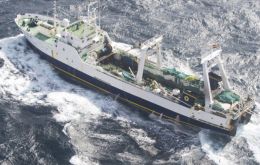
In a global context of fierce competition for fishery resources which are progressively being depleted as a consequence of overfishing, overexploitation and overcapacity, illegal, unreported and unregulated (IUU) fishing has become a growing concern, points out a FAO fisheries release.
-
Tuesday, April 28th 2015 - 05:38 UTC
Australia intercepts and boards the fishing vessel 'Perlon', from the IUU list
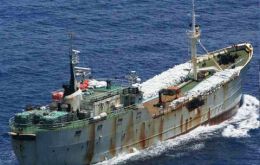
Australia has intercepted in the Southern Ocean the fishing vessel Perlon, believed to have been operating under a false flag in defiance of international conventions, according to an official report from the Ministry of Immigration and Border Protection.
-
Thursday, April 23rd 2015 - 09:19 UTC
Sunken Russian fishing vessel found at a depth of 2,700m, off Gran Canaria

Russian flagged fishing vessel “Oleg Naydenov” was found by a remotely operated vehicle 15 miles south of Gran Canaria, at a depth of 2,700 meters, Minister of Development Ana Pastor Julian informed. At first, it had been reported that the ship, which sank last week, could be at about 2,400 meters deep.
-
Thursday, April 23rd 2015 - 09:07 UTC
NOAA Fisheries names three Latam countries in illegal fishing activities

United States NOAA Fisheries (National Oceanic and Atmospheric Administration) has released its 2015 Biennial Report to Congress highlighting U.S. findings and analyses of foreign illegal, unreported, and unregulated (IUU) fishing activities and of by-catch of protected species and shark catch on the high seas for foreign fleets.
-
Tuesday, January 27th 2015 - 06:27 UTC
Interpol issues Purple Notices on three vessels illegally fishing in Southern Ocean
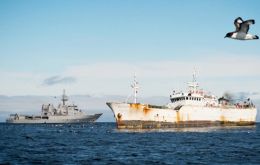
At the request of New Zealand, INTERPOL Purple Notices have been issued to seek information on the individuals and networks behind three vessels fishing illegally in the Southern Ocean.
